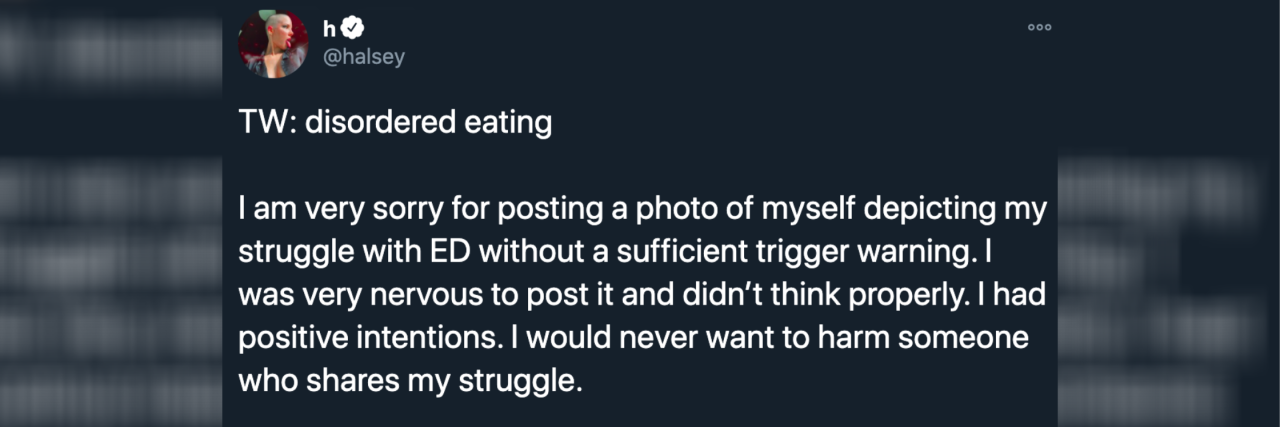Why Halsey's Photo of Her 'Lowest Point' Was Met With Backlash
Editor's Note
If you live with an eating disorder, the following post could be potentially triggering. You can contact the Crisis Text Line by texting “NEDA” to 741741.
On Monday, December 28th, pop superstar Halsey posted an Instagram photo of herself in response to a fan’s request to share a photo “from [her] lowest point.” The “Graveyard” singer, 26, who shared the photo on her Instagram story, captioned the photograph “TW: ED, ask for help,” referencing her past struggles with an eating disorder.
The photo sparked controversy because many of Halsey’s fans believed that she hadn’t provided enough of a trigger warning for the sensitive photo. Halsey has since deleted the photograph and issued an apology via Twitter, writing, “I am very sorry for posting a photo of myself depicting my struggle with ED without a sufficient trigger warning.” She continued, “I was very nervous to post it and didn’t think properly. I had positive intentions. I would never want to harm someone who shares my struggle.” She then tweeted that she was going to “log off [Twitter]” because she wasn’t “emotionally equipped to handle” the response to the photo.
TW: disordered eating
I am very sorry for posting a photo of myself depicting my struggle with ED without a sufficient trigger warning. I was very nervous to post it and didn’t think properly. I had positive intentions. I would never want to harm someone who shares my struggle.
— h (@halsey) December 28, 2020
Though Halsey deleted her photo after criticism for posting herself at a low moment of her eating disorder. Some may feel that her decision to honestly share her lowest point with her fans was courageous. Although celebrities have become increasingly open about their struggles with eating disorders, it’s still relatively rare for stars to share their eating disorder experiences. The stigma that eating disorders and other mental health conditions carry prevents many from opening up and seeking treatment, and it’s magnified for celebrities with large fan bases. Halsey’s candor about her eating disorder could inspire her fans to share their challenges with disordered eating and body image and possibly even seek life-changing help for their eating disorder behaviors.
However, how we spread eating disorder awareness is important, and there’s a reason why the National Association of Eating Disorders warns against sharing what’s known as “before” photos.
Body comparison is a common struggle for those with eating disorders, and someone with an eating disorder may use others’ thin bodies to determine their own worthiness of help. Those with distorted body image may also see photos like Halsey’s and emulate her fragile appearance, even if they’re already at a dangerous weight for their body type. Seeing these types of photos as someone in recovery can increase a wide variety of eating disorder behaviors, especially if they see a similar photo posted without any type of trigger warning beforehand.
Halsey’s decision to apologize to her fans was important– it solidified that she understands that posting eating disorder “before” photos without a clear trigger warning can harm those who struggle. The feelings of nervousness she mentioned in her apology reflect the stigma that surrounds eating disorders and the split-second decision she may have made about her fans’ potential triggers. But even though Halsey didn’t have ill intent when she posted the photo, she could have included some reputable resources for those who battle eating disorders so that her fans could have a safe way to cope with any unexpected distress they may have faced.
Halsey’s photo begs an important question: What should eating disorder awareness actually look like?
Ideally, eating disorder awareness advocates should share their personal stories and emphasize that eating disorders can affect anyone but refrain from sharing specific numbers, sizes or weights. Those wishing to spread eating disorder awareness should be mindful of common triggers for people in recovery and keep stories and posts as trigger-free as possible or include trigger warnings above their posts. With this approach in mind, people who want to share their recovery stories can do so in a safe, edifying way– and the people they connect with will feel supported in their own recoveries.
Image courtesy of Halsey’s official Twitter account

